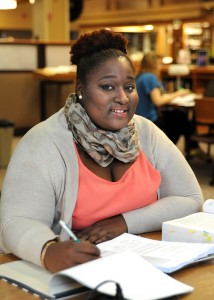Joi Lyons isn’t out of law school yet, but the Chicago resident has already felt the thrill of helping someone out of a bind by using her legal skills.
Lyons, a third-year student at The John Marshall Law School, works at the school’s Fair Housing Legal Clinic. Lyons was on duty one day when a woman walked into the Clinic to complain about extra charges her landlord demanded to cover repairs that would make the apartment meet Chicago Housing Authority (CHA) requirements. The landlord was trying to evict the woman, a Housing Choice Voucher holder, because she hadn’t paid for the repairs.
The woman turned to the Clinic—celebrating its 20th year of service in 2013—because it offers free legal assistance to people facing discrimination in their housing choices. This landlord/tenant problem is just one of many issues that students and attorneys work on.
Lyons verified the woman’s story, did a little investigating and made a few telephone calls, including one to CHA. While the Clinic staff attorneys supervising the students were meeting to decide whether to take the case, the woman, who was still sitting at Lyons’ desk, got a call on her cell phone. It was the landlord telling her she didn’t need to worry about those extra charges.
“It felt great. She was just hugging me and smiling,” Lyons recalled. “It’s the reason I came to law school in the first place and here I was—fixing that lady’s problem.”
All in a day’s work for Lyons and the other students participating in the only law school legal clinic in the United States that exclusively handles fair housing cases. Clinic students work with persons facing discrimination in their housing choices because of race, color, national origin, religion, sex, familial status, mental or physical disability, sexual orientation, marital status, or source of income.
Over the past two decades, the clinic has represented more than 900 clients who were discriminated against in violation of federal, state, county and city laws.
The John Marshall Law School has a long tradition of experiential learning for its students, aiming to make them practice ready upon graduation. Many John Marshall students take advantage of the chance to hone their skills in a real-world environment. Each year, hundreds of students participate in a variety of externships, pro bono programs and take on cases at the school’s legal clinics including the Fair Housing Legal Clinic; the Veterans Legal Support Clinic, the Business Transactions Externship Program and the Patent Law Clinic.
In fact, John Marshall recently appointed a new associate dean for skills, experiential learning and assessment, Anthony Niedwiecki, who will be in charge of all of the law school’s offerings of hands-on programs.
“Our commitment to providing students with real-world experience has two benefits—our graduates are ready to practice law the moment they leave John Marshall, and we are able to provide access to the judicial system for those in our community most in need of help,” Niedwiecki said.
Lyons, who has wanted to be a lawyer since she was a child, has taken advantage of more than one John Marshall opportunity for real-world legal practice. Her first summer of law school, she clerked for the Cook County State’s Attorney’s Office. She has qualified for a 7-11 license, which allows senior law students to represent clients in court with a supervising attorney, and is using it in her fair housing work and for cases she is handling through the Pro Bono Program.
At the suggestion of one of her professors, Lyons has restarted the school’s Public Interest Law Council. “I’ve always considered myself a civil rights attorney at heart,” Lyons said.
So as she begins her third year of law school, this young woman with a husband and an 8-year-old son, is living her childhood dream.
Additional information is at www.jmls.edu/fairhousing.

